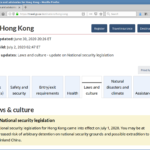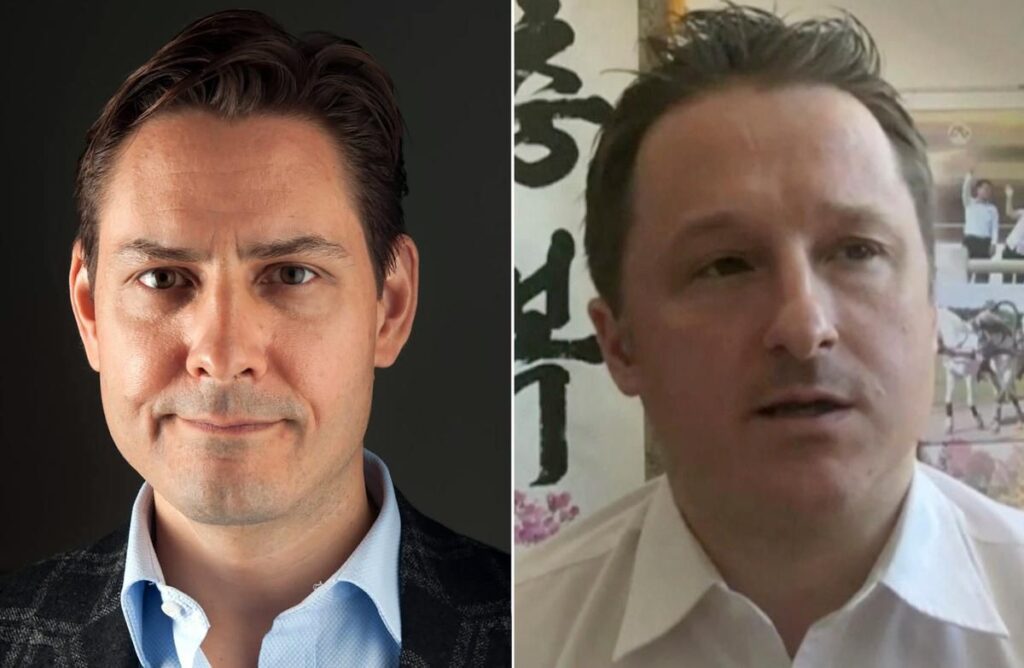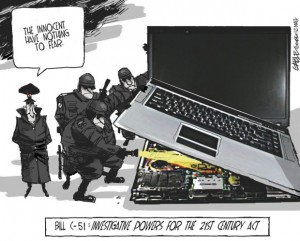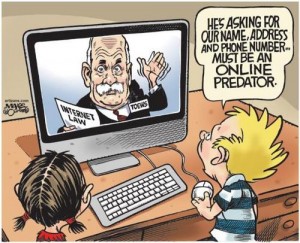It seems bizarre to me to be writing about this kind of medieval or (I suppose) Cold War-type prisoner swap in the 21st century, but it seems that some countries (namely China) are still in that kind of backwards mindset. (This is particularly ironic, given the assertion by the deputy director of the Chinese Ministry of Foreign Affairs Information Department [Zhao Lijian] that other countries [namely the US] suffer from a “Cold-War mentality“! Proof that politicians everywhere talk out of both sides of their mouths.)
I’d like to make clear a few of my assumptions and biases first:
- I am not under the influence of China or any Chinese pressure groups, and presumably the authors of both of the letters to which I refer below are not either,
- I travel internationally as much as I can, and although I have travelled to China, I have not (so far) knowingly travelled to any countries where my life or liberty might be in danger,
- I am a dual citizen.
I have read the letter from the “distinguished Canadians” to Prime Minister Justin Trudeau (cached copy), and I think it forms a basis on which Canada could move forward. It disgusts me that a reasonably civilised country like Canada should be in this position, but it is; it’s similarly repugnant that a country like China, who would like to present themselves to the world as being civilised (all the while acting the global bully wherever it thinks it can get away with it), would do such a thing. But they have, and here we are. And why have they taken hostages? Well, Meng Wanzhou isn’t some low-life drug trafficker or any other alleged common criminal; she seems to be about as close as you can get to royalty in China in the modern age, just without (obviously) the diplomatic immunity. Quite frankly, their taking hostages is the international equivalent of an unhappy child throwing their toys out of their cot!
Among the objections to this course of action are those of Trudeau himself (and presumably therefore the Government of Canada) and 53 signatories of an opposing letter from the Macdonald-Laurier Institute. The objections seem to boil down to three primary issues, with a fourth unstated openly by the Canadian government:
- Principles: A prisoner swap would weaken Canada’s principles. It matters not that two innocent Canadians have been deprived of their liberty for a year and a half (so far), as long as some unarticulated principle is upheld. I’ll address that shortly.
- Giving in to hostage takers: I see the value in not giving in to the demands of hostage takers, but in my mind there is a significant difference between a hostage taker that also happens to be a state, and a hostage taker that is an individual or a group (e.g., a terrorist organisation), i.e., not a state. Quite frankly, a state that violates the norms of international practice (if not law) and takes hostages, is a pariah state, and one that should be isolated by all states. Of course, I’m no naïf, and I know that a superpower like China can’t and won’t be isolated by all states, but there are measures that Canada, and others, can take. Also more on that shortly.
- Endangering travelling Canadians: As if Canadians are somehow magically protected when they’re travelling internationally now, the assertion is made that negotiating the release of Michael Spavor and Michael Kovrig will result in Canadians abroad being taken hostage with more frequency. I feel that theory holds when we’re talking about hostages taken by the aforementioned individuals or groups, but not when we’re talking about hostages taken by states. If the principles of due process, comity and international law are not strong enough to prevent states from exercising their unlimited power within their own borders to arbitrarily detain random foreigners, does anyone really think that an unspoken “disapproval” of hostage taking is going to achieve the same goal?!
- Canada’s commitment to lawful extraditions, and in particular to the United States: While there is no doubt that following some sort of process to “free” Chinese citizen Meng Wanzhou from Canada’s legal system will royally piss of the Americans, let’s not lose sight of the fact that her arrest under an extradition request is nothing short of the United States using an extradition treaty to prosecute their global foreign policy (particularly against Iran and China in this case) through a third party (Canada), not enforcing criminal law alleged to have been broken on its own soil by one of its own citizens. Now, I don’t claim any expert knowledge of extrajurisdictionality (especially as the principle applies to international sanctions), but it seems to me that this must be considered differently to cases involving the citizens of one’s own country fleeing to other jurisdictions to avoid prosecution in the home jurisdiction. In my opinion the United States and China — their empires colliding — need to use other means to carry out their mutual attempts to exert international control, in ways that don’t compromise their so-called allies … or in the latter’s case, the country that many of their citizens now call home, and will likely be calling home to a greater extent following Beijing’s crackdown on freedom in Hong Kong.
On the part of those advocating something more expedient (so to speak) there are the principles of fairness and humanity. It’s not news to most people that communist systems tend to “[override] individual self-interest and [subjugate] the welfare of the general population to achieve [their] goals“, and it’s quite clear to any observer that the “individual self-interest” of the Two Michaels (or their families) is of no interest to the Chinese Government. Then there’s the degree to which Canada’s foreign policy (especially with respect to China) has been hobbled by their inability to speak more bluntly where China continues to abuse its own citizens ([Hong Kong] (whose refugees will shortly be flooding Canada, the UK and other countries), [Tiananmen Square], etc.), its neighbours ([India], [Taiwan], etc.), and others around the world — as they are doing to Canada right now. If a country’s policy in one area or another is hobbled by an identifiable cause, then it certainly is a matter of national interest and perhaps security to take whatever action is necessary to address the problem!
So what’s my suggestion? Glad you asked. I think Canada should negotiate and implement these points:
- The last thing Canada should do is simply “free” Meng Wanzhou and then “hope” that China reciprocates. That’s just insanity! Even if they do reciprocate, it could still be years before the Two Michaels are released under one mechanism (also trumped up) or another, simply to show who has the power in the relationship, and to give China the ability to claim (falsely of course) that the release of the Michaels was not connected. No, if China has actually gone as far as to tacitly acknowledge that they have apprehended the Michaels on trumped-up espionage charges, then Canada should publicly state to China that we are ready to negotiate a prisoner swap, and move to begin the negotiations. (To quote China: “Zhao Lijian: … we have also seen reports of an interview with Kovrig’s wife on June 23, during which she said that the Canadian justice minister had the authority to stop Meng Wanzhou’s extradition process at any point; such options are within the rule of law and could open up space for resolution to the situation of the two Canadians.“)
- The prisoner swap must be very public, and televised on live television in both countries. Since Canada and China don’t share a land border, I suggest that a Royal Canadian Navy ship meet with a PLA Navy ship in the middle of the Pacific Ocean to do the exchange, preferably over a gangplank between the ships. Alternatively, and slightly more practically I suppose, the prisoner exchange could take place on one of China’s land borders, or perhaps in the Korean DMZ.
-
One of the less obvious unilateral actions that Canada (and actually, all countries) should take in the current international climate is to start negotiating bilateral “non-hostage” treaties with other countries, possibly connected to extradition treaties. How would these work? Well, you simply make a pact with another country that neither of you will take each other’s citizens hostage. Of course, arrests in the course of normal law enforcement would be acceptable, but not arbitrary detentions with no evidence. If Canada doesn’t have such a non-hostage treaty with a country, then the travel advisory for that country would state, in very prominent and unambiguous wording, that a such a treaty does not exist and therefore Canada very strongly warns against travel to that country. (There is currently, as of 10 July 2020, a similar warning on the Government of Canada Hong Kong travel advisory [see screenshot] on the “laws and culture” tab, but it is neither prominent nor strong enough, and there is nothing on the China travel advisory advising against travel there except for COVID-19 reasons.) Without a non-hostage treaty, if a Canadian citizen (for the sake of this example) is arbitrarily detained (taken hostage) then Canada will make attempts to provide consular assistance, but will not try that hard. This is more likely to have a greater effect on dual citizens (of which I am one, I should make clear), especially for those for whom Canadian citizenship is a citizenship of convenience.
I have no doubt that the Government of Canada is indeed “doing” something in the background (as happened in Egypt recently), even if it’s just talking amongst themselves, but to the rest of us beer-swilling plebs in the deserted (at the moment) pubs and stalking the blogosphere, it sure looks like the safety and security of Canadians abroad is not a concern to Canada, contrary to their professions otherwise.
Canada is small potatoes to China, in probably every way you can think of except land mass, coastline and morals, but everyone learns when they are still a child that bullies can be stood up to. This is what Canada and most of the rest of the world must to do to stop, or at least ameliorate, China’s bullying tactics. I don’t in any way suggest that China needs to be stomped down as the “enemy”, but just as happens with individual humans they have become too big for their breeches, and for that there are or need to be consequences. Part of the “problem” with China is not even the fault of the Chinese; it’s the West’s constant obsession with “unlimited growth”. However, that’s a debate for another day.







